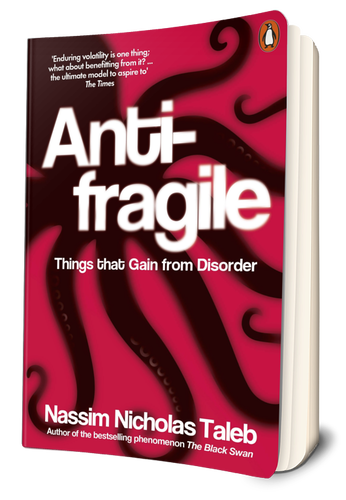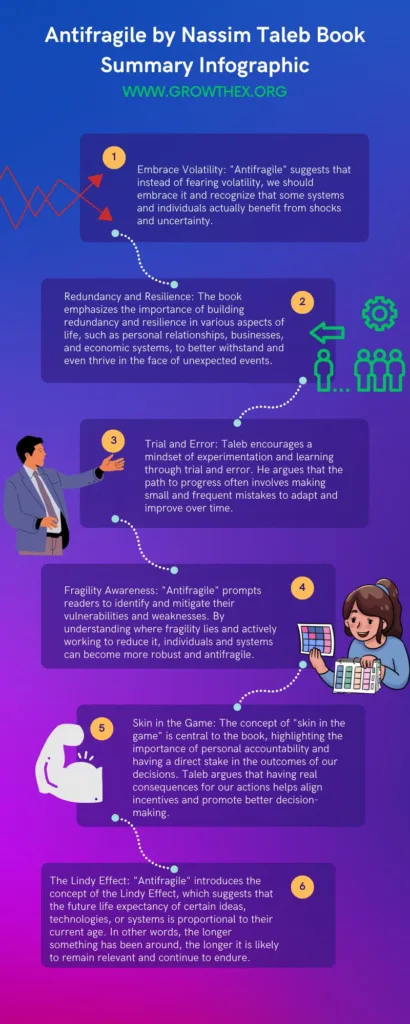The book that has had a significant impact on my thoughts. Antifragile is a fantastic book if you like the stuff on this website.
“Antifragility” is the book’s main concept, and Taleb defines it in the Prologue:

“Certain things thrive and grow when exposed to volatility, randomness, disorder, and pressures; they also embrace adventure, risk, and uncertainty. Some things profit from shocks. Despite this widespread phenomena, there is no word that describes the exact opposite of fragile. Let’s refer to it as antifragile. Beyond resiliency or robustness comes antifragility. The antifragile improves while the resilient withstands shocks.
The phrase “something that has more upside than downside from random events shocks” can also be used to describe it. An egg won’t profit from having a 5 lb weight placed on it, yet similar stressors on your body can make you stronger.
This further the points made in Black Swan. The Antifragile can prosper in the presence of a Black Swan event. Nonetheless, the weak frequently succumb. Or, to put it another way, positive black swans can help the Antifragile.
Fragility is characterised by having more to lose than to gain, more downside than upside, and adverse asymmetry.
The definition of antifragility is “more to gain than to lose, more upside than downside, and positive asymmetry.”
Hydra, Phoenix, and Damocles
Taleb explains the trinity of Fragile, Robust, and Antifragile with examples from antiquity. Damocles is weak; he eats with a sword hanging over his head. He will perish if the string carrying the sword is even slightly stressed.
The Phoenix is a powerful creature that perishes and then rises from its ashes. While under intense stress, it always reverts to the same state.
Yet, the Hydra exhibits antifragility. Two new heads develop after the removal of one.
Fragile & Antifragile Jobs
Taleb contrasts the tenacity of some professions with their dichotomy. Nothing an author can do to get notoriety, for instance, will stop people from buying his novels.
If you punch a bothersome drunk in a bar, however, and you’re a midlevel executive employee at some bank, you’ll probably get fired, receive an arrest record, and be unable to obtain a job again. You are quite vulnerable.
At the other end of the spectrum, let’s say as a taxi driver, you once again have greater freedom because you are less reliant on your reputation.
Field Dependency
There are occasions when we comprehend something in one domain but fail to apply the underlying reasoning in another. Even though many statisticians are proficient in statistics, basic thought experiments can still stump them. To use the stairmaster in the gym, people will take an elevator.
Although we are aware of the advantages of stress in terms of medicine and health, we do not apply it to other facets of life. Modest financial strains can help you avoid building up silent danger or getting arrogant. Little disagreements in your relationship might make it stronger and help you avoid larger disagreements.
Hormesis, Small Stressors & Inverse Hormesis
Another illustration of antifragility is hormesis. Similar to how immunisations employ a little amount of a disease to educate your body to fight its greater form, eating small doses of a poison can help you build up more immunity to it.
We observe comparable antifragile advantages from weightlifting, jogging, and fasting. And anyone who has never experienced hunger or exercised will attest to the detrimental effects of depriving systems of these healthy stimuli.
According to Taleb, a lack of stress accelerates ageing. Although we are living longer, more people are becoming ill. Our health spans have all been harmed by our comfort. While we previously believed that bone deterioration is a result of ageing, the opposite appears to be true.
Competition
This also applies to athletic competition. The best horses struggle against slower opponents and triumph over stronger ones. The best among us can be degraded by a lack of challenge.
Distraction
Another illustration is the fact that background static makes it simpler to pick up radio signals. You can focus better while writing in a café with background discussions. We want some, but not too much, stress.
Moods
Taleb also emphasizes how common antidepressants are and how mood fluctuations are a normal aspect of being human. Sure, if someone is seriously considering suicide, but the capacity to confront our dark side is a vital aspect of life and a great source of inspiration for artists.
Problems with Modernity
Taleb highlights a number of issues with contemporary life, most of which result from the removal of the beneficial natural stressors.
The zoo’s lions
Think about a lion’s existence in the wild and in a zoo. Even though the lion in the zoo may have a longer life, is that really a life worth living? Taleb reminds out that we used to have “free range humanity,” before such things as suits and soccer mothers and gym machines.
Naive Intervention & Iatrogenics
Iatrogenics, which means “damage produced by the healer,” can result from a misplaced desire to act, especially from doctors.
More people die from harm caused by doctors than from any one type of cancer.
There are two types of iatrogenic errors: those that are evident, like amputating the wrong leg, and those that are less visible, such negligently administering antidepressants and ADHD medications.
The Agency Issue
The agency problem, in which the agent’s (doctor’s) interests differ from those of the person receiving his services, contributes to some of the problem (the patient).
Editing
Taleb recounts how the Washington Post aggressively altered his essay for writing style; as a result, he withdrew it and offered it to The Financial Times, who only made one edit—to change a date. He makes the observation that WaPo missed the single significant error in its attempt to overedit.
Optimal Procrastination
Taleb emphasizes that delaying decisions is sometimes a good thing since it allows us to recognise the seriousness of a situation. When a lion is coming for us, we don’t put off responding to emails, but it’s probably okay to put it off.
Antifragile by Nassim Taleb Book Review
“Antifragile” is a non-fiction book written by Nassim Taleb, a former options trader and risk analyst. The book challenges the conventional wisdom of risk management by introducing the concept of antifragility, which refers to systems that thrive under stress and volatility.
Taleb’s writing style is thought-provoking and often controversial, making “Antifragile” a challenging read for some readers. However, those who are willing to engage with Taleb’s ideas will find a wealth of insights into how to build robust systems and organizations that can withstand uncertainty and disruption.
The book is divided into five parts, each of which explores a different aspect of antifragility. Taleb draws on a wide range of examples, from the natural world to human societies, to illustrate the principles of antifragility and to show how they can be applied in different contexts.
One of the key strengths of “Antifragile” is its emphasis on practical applications. Taleb provides readers with a set of tools and principles that can be used to design antifragile systems, such as embracing redundancy, fostering diversity, and avoiding complex systems that are prone to failure.
Another strength of the book is its engagement with current events and contemporary issues. Taleb uses examples from the financial crisis, politics, and other areas to illustrate the dangers of fragility and the benefits of antifragility.
Overall, “Antifragile” is a challenging but rewarding read that provides readers with a new perspective on risk management and system design. It is a must-read for anyone interested in building resilient systems and organizations that can thrive in an uncertain and volatile world.

If you really like this “Antifragile by Nassim Taleb Book Summary” by Growthex then you can also check out some more amazing posts | summaries which are freely available on this platform :
- 4 important lessons from Money master the game
- The pomodoro technique – good book for productivity
- 10 minute toughness – read it if you think you are lazy